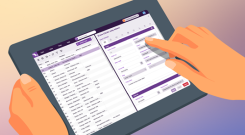The Web version
This site is customised for the Windows version of Case Manager. However, this particular page details the way that the Web version of Case Manager differs from the Windows version. The information is not relevant to you unless you use both versions.
The Web version of Case Manager has some powerful advantages:
- Anywhere, any time: you can run it wherever you can run a web browser (Google Chrome, Firefox) on the internet
- Cross-platform: you can run it on a Macintosh computer or a tablet, such as an iPad
- Fast out of the gate: you don't have to install a program
- Device-independence: if your computer dies you can just move to another one
Case Manager for Web is our recommended platform of choice. It is faster, cleaner and more intuitive, with a number of new features. Click the image below to access details:
Browser Requirements
When using the Web version of Case Manager, we recommend the latest version of the following browsers:
Windows Operating Systems
Google Chrome.
Microsoft Edge.
Macintosh Operating Systems
Google Chrome.
Microsoft Edge.
Differences in the Web version
A program that runs in a web browser inevitably has some differences compared to a program running on a Windows computer.
Thus, there are some differences between the web version of Case Manager and the Windows version.
This information below is intended for users who are already familiar with the Windows version and want to transition quickly.
|
Selecting records |
When you log in to the web version, you notice that the right hand side of the screen is blank. Select a case and its information will be displayed on the right. This concept applies to all grids. |
|
Modal pop up windows |
In the Web version pop up windows are usually modal, i.e. you must close them before returning to where you were. Thus, you can only have one window open at a time, in contrast to the Windows version. When you do want multiple windows open in the web version, simply open a new browser tab and log into Case Manager in the second tab. |
|
Adding new entries to dropdown lists |
Usually you can't simply type in new list values and have them added to the appropriate list, as you often can in Windows. Instead you first add the new value to the list at the list's editor. |
Grids
|
Searching |
Searching grids is different in the web version and there's a new global search facility. See Quick searches in the web version for details. Advanced searches using the Filter Editor are currently only available in the Windows version. |
|
Conditional formatting |
Conditional formatting is not available in the current release of the web version. |
Accounting
|
Invoice templates |
In the current release, you can change the heading and line item details in invoice templates. However, you cannot edit the invoice layout using Report Designer. Please ask Support for assistance if necessary. |
| Rate Rise Utility | The Rate Rise Utility is currently only available in the Windows version. |
Documents
As you know, Case Manager can open, edit and save both plain and formatted text documents. However, for documents such as Word files Case Manager needs to 'pass' these document to the appropriate software (Word, Excel, PowerPoint, etc) to open, edit and save them. Then the updated documents need to come back into Case Manager.
In the Windows version you usually do not notice this happening. In the web version you may need to get more actively involved.
In the web version such documents are stored on a hosting server in the 'cloud'. Thus to edit them they must be downloaded to your computer so that your copy of Word etc can open them. They are then edited, saved and uploaded back to the Case Manager system. A locking strategy must be in place ensure that multiple users do not change the same downloaded document on separate computers and then upload and overwrite each others' work.
Case Manager provides fairly simple solutions to this issue. For more information see
Other small differences are:
|
Drag and drop document |
This action is the same in both versions except the web version does not provide an option to move the file. It always creates a copy. |

